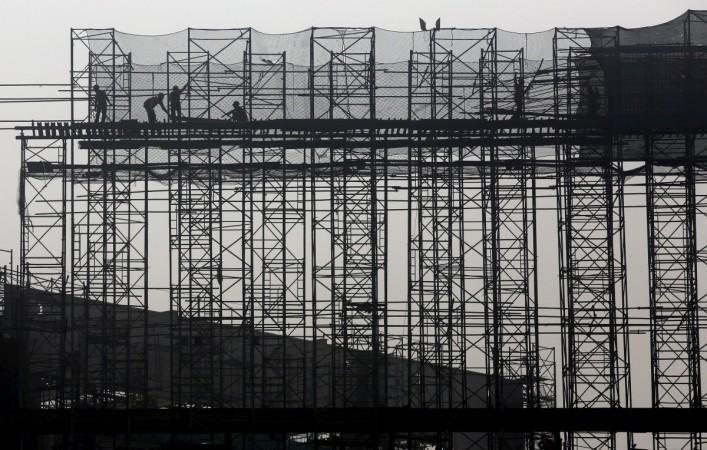
India could well lose its "world's fastest-growing economy" tag, thanks to the impact of the de-monetisation of high-value currencies on its economy. This is so because real estate, gold and the informal sectors that see a high element of cash transactions are expected to slow down, according to India Ratings (Ind-Ra).
The move to scrap the old series of Rs 500 and Rs 1,000 notes with effect from November 8 midnight and replace them with a new series of Rs 500 notes and introduce a new denomination (Rs 2,000) was described by Prime Minister Narendra Modi as a significant step in the fight against black money.
"The sudden decline in money supply and a simultaneous increase in bank deposits is going to adversely impact consumption demand in the economy in the short term. This coupled with the adverse impact on real estate/construction and informal sectors may lead to lowering of GDP growth," the rating agency said in a note on Friday.
It also said that the decision also needed to be seen in the context of "disappointing" response to the Income Declaration Scheme (IDS) 2016, a four-month window for people with undisclosed income to come clean. The scheme ended on September 30, 2016.
"Income Declaration Scheme 2016 unearths Rs 65,250 crore of hitherto Undeclared Income and Assets; 64,275 declarations filed under IDS-2016 up to the midnight of 30th September 2016," the finance ministry said on its official Facebook page on Saturday evening.
Based on the 45 percent tax applicable on the income disclosed, according to the scheme, the government will get Rs 29,362.5 crore.
Highlights of the India Ratings note:
Cash Economy To Witness Contraction
The currency of the aforesaid denominations constitutes around 86 percent of the total value of the currency in circulation, thus its impact on the cash economy will be significant. The key segments of the economy where cash transactions play a vital role are real estate/construction, gold and the informal sectors. The role of cash transaction in case of real estate and gold is mostly dubious, however in case of the informal sectors it is the lifeline.
For example, small and marginal farmers in the fruits and vegetable category typically require off-loading of their produce in the local Mandi in cash and could see an immediate impact. A sudden demonetisation will adversely impact this segment of the economy and it will witness immediate contraction, though the impact will diminish over time.
Downward Bias to GDP Growth
The sudden decline in money supply and simultaneous increase in bank deposits is going to adversely impact consumption demand in the economy in the short term. This coupled with the adverse impact on real estate/construction and informal sectors may lead to lowering of GDP growth. However, Ind-Ra feels the impact will be felt more in Q3FY17 and the system is expected to readjust thereafter. Therefore, Ind-Ra retains its GDP growth forecast of 7.8% for FY17 with a downward bias and will monitor this aspect closely.
Positive for banking sector
A large amount of cash in circulation will be brought within the purview of the formal banking system by way of deposits. This is structurally a positive for banks as part of this cash gets deposited as current account and savings account (CASA) deposits, reducing banks dependence on higher cost borrowing. Deposit deployment remains a challenge in the short to medium term due to the current tepid demand for credit, thus pushing deposit rates lower.
Auto Secondary Sales May Fall
Sales of vehicles in the second hand market for original equipment manufacturers will get impacted, which will have a ripple effect on OEM sales, as buyers will not be able to dispose of their old vehicles easily.
Demand for Gems and Jewellery to Decline
The demand for gems and jewellery is likely to decline in the next two to three quarters. This would result in weakening in the credit profile of industry players due to the high working capital cycles and high operating leverage. The unorganised segment will be hit particularly hard given the large proportion of unaccounted inventory and high proportion of cash sales. Over the medium-term the organised industry players will benefit at the cost of the unorganised players. Gold imports through the unofficial channel are likely to reduce. There will be no significant impact on jewellery exporters because it is mostly an organised market and sales are against invoices.
High End Retail Demand to Fall
The impact on high end fashion retail and luxury goods is expected to be more pronounced as discretionary demand in this segment will be curtailed. In case of Quick Service Restaurants, although 60%-70% of the transactions are currently in cash, the impact is likely to be moderate due to the low ticket size of purchases and high likelihood of patrons adapting to plastic money. We expect a limited impact on the food and grocery retail sub-segment, given the non-discretionary nature of purchases in this segment, as well as since the buying cycle for the current month would have been largely completed. Ind-Ra expects demand across the retail sub-segments to shift to the organised segment over the medium term.
















